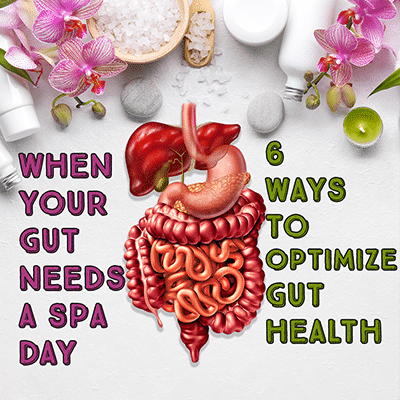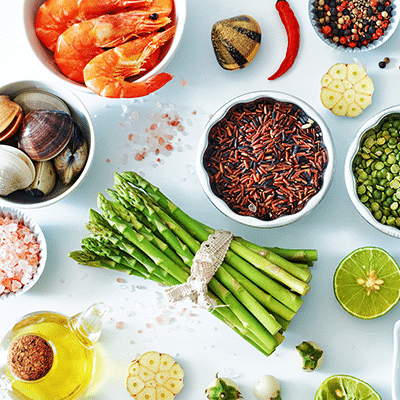When Your Gut Needs a Spa Day: 6 Ways to Optimize Gut Health

In previous articles, we’ve talked all about how your health starts in your gut.
An imbalance of your gut bacteria called gut dysbiosis and it can affect all the systems of your body.
This upset of your gut microbiome, your gut microorganisms and their genes, can cause a domino effect which can lead to:
More research continues to pile up linking the effects of gut dysbiosis and your health. From the foods you eat, to the air you breathe, it can have an impact on every aspect of your health.
What is Gut Health?
You have trillions of microorganisms residing in the human body and the collection of these microorganisms make up the human microbiome. These can be found in your eyes, skin, digestive, and respiratory system – they are essential to keeping you alive.
Within this human microbiome is your gut microbiome – a very diverse community. This consists of your gut microbiota including bacteria, parasites, and viruses.
Previously, we talked about how an unhealthy gut microbiota can affect your health, but how exactly?
Your gut microbiota can be categorized into 3 groups:
- Beneficial (essential) microbiota – These are the microbes which keep you healthy through your immune system. They specifically fight off harmful bacteria and keep your digestive system working properly.
Major beneficial players include:
- Bifidobacteria
- Lactobacteria
- Enterococci
- Propionibacteria
- Lactococcus
- Bacillus
- Peptostreptococcus
- Opportunistic microbiota – This group of bacteria are usually what wreak havoc in your body if not controlled by your beneficial microbiota. If your essential microbiota can’t fight off these guys due to a weak immune system, then this can lead to disease and serious health issues.
Major opportunistic players include:
- Staphylococci
- Streptococci
- Gonococcus
-
- Clostridia
- Bacteroides
- Yeasts
- Enterobacteria
- Fusobacteria
- Transitional microbiota – These enter your digestive tract from the environment surrounding you. Again, your beneficial microbiota should be able to fight these transitional microbes off, but in those with a damaged immune system it can cause harm.
Major transitional players include:
- Toxins
- Parasites
- Chemicals
Whatever group of microbiota you choose to feed plays a major role in your gut health.
You aren’t eating for one – you’re eating for the trillions of these little microbes in your gut, since they thrive off of the nutrients you eat.
Signs Your Gut Bacteria Are Out of Whack
How do you know if you have a healthy gut? A few ways to tell if you’re in need of a good gut spa day are:
- Digestive issues such as:
- Bloating
- Cramping
- Diarrhea
- Constipation
- Heartburn/acid reflux
- Chronic stress
- Autoimmune disease
- Mental troubles like depression, anxiety, or brain fog
- Antibiotics
- Vitamin and mineral deficiencies
- Skin conditions
- Food allergies or intolerance
These are your red flags. If you are experiencing any of these, it’s time to put new gut health rituals in place.
6 Ways to Optimize Your Gut Health
Maintaining plentiful colonies of your beneficial bacteria and keeping the opportunistic bacteria at bay is crucial for your overall health.
Following the 6 ways to optimize your gut health can keep your digestive system on track and in optimal health.
- Treat any underlying gastrointestinal issues, FIRST – Do not skip this step before moving to the next. Things like leaky gut and irritable bowel syndrome can stem from what is called small intestinal bacterial overgrowth (SIBO). This overgrowth of bacteria is causing inflammation in your gut, not allowing for proper digestion and absorption of nutrients and an abundance of gases which can cause adverse symptoms.
Even if you change your diet and take probiotics, SIBO bacteria can run rampant. So treating your small intestinal bacterial overgrowth is necessary before the following 6 steps can be taken.
- Gut health depends on your diet – Usually, when most of us eat, we eat for taste not thinking about who we’re feeding – your beneficial bacteria or your opportunistic bacteria. If you’re eating processed junk food, which contains sugar and carbohydrate content you’re giving the opportunistic bacteria the perfect environment to thrive in. Instead, find foods rich in polyphenols, which promote a diverse and healthy microbiome.
Foods that promote gut healthy flora include:
- Cruciferous vegetables
- Fruits
- Lean meats and fish
- Fermented foods
- Fiber
- Prebiotics feed your healthy gut bacteria – Different from probiotics, prebiotics are non-digestible fiber found in the foods you eat. This means they pass through your upper GI tract undigested until they get to your colon where most of your bacteria reside.
Just as you fertilize the plants in your garden, prebiotics are the nutrients for your healthy bacteria to grow.
- Avoid medications affecting your gut health – The following medications can cause a real upset in the balance of your bacteria:
- Antibiotics
- Proton pump inhibitors
- Atypical antipsychotics
- Non-steroidal anti-inflammatory drugs
- Chemotherapy drugs
- Oral contraceptives
If these medications are unavoidable, be sure to be on the lookout for the development of SIBO and treat if needed..
- Steer clear of toxins and antimicrobials – Antimicrobials in your cleaning supplies and toxins in your day to day environment can deplete your beneficial bacteria. You can’t completely eliminate these probiotic-destroying elements, but you can be more conscious of choosing less toxic alternatives. Be sure to choose organic whole foods, filtered water, natural products, and cleaning supplies free of harmful chemicals.
- Manage your stress – Everyone lives with stress, no matter if it’s from your work or your full-time job as a parent – you can’t avoid it sometimes. But you can learn how to manage it.
Instead of having a major meltdown in front of your family and friends – which sometimes can’t be avoided – try going on a jog or practice yoga. Too much stress has been shown to alter your gut microbiota, but getting your sweat on can improve this gut dysbiosis.
You can see how important a healthy gut is for overall wellness. Atrantil is a prebiotic which not only nourishes your microbiome, but can also naturally eliminate the unwanted bacterial growing in your small intestines.
Atrantil’s natural ingredients are powerful enough through their polyphenols to protect and support overall digestive health.
https://atrantil.com/fight-alzheimers/
https://atrantil.com/gut-health-autoimmune/
https://atrantil.com/sleep-gut-bacteria/
https://atrantil.com/5-ways-to-improve-food-allergies-and-asthma/
https://atrantil.com/cure-anxiety/
https://atrantil.com/gut-microbiome/
https://atrantil.com/rosacea-sibo/
https://www.ncbi.nlm.nih.gov/pmc/articles/PMC5433529/
https://www.ncbi.nlm.nih.gov/pmc/articles/PMC5048567/
https://atrantil.com/root-cause-of-sibo-and-ibs/
https://www.ncbi.nlm.nih.gov/pmc/articles/PMC5045146/
https://www.ncbi.nlm.nih.gov/pmc/articles/PMC5515271/